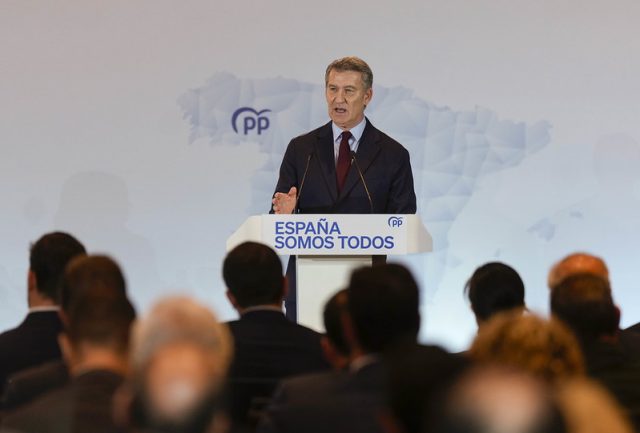
The centre-right Partido Popular (PP), the largest party of the Spanish opposition, ruled out for the moment presenting a vote of no-confidence against Prime Minister Pedro Sánchez, after much speculation around their response to the investigation around the premier’s alleged influence peddling scandal.
The PP’s parliamentary spokesman, Miguel Tellado, confirmed the do not have a majority that would allow said vote to prosper.
For Tellado, pushing for a vote would constitute “a political mistake” and would only serve to reinforce Pedro Sánchez’s hold of power.
This course of action, however, might be temporary as more revelations around alleged corruption plot surface every week
The PP maintains its leader—Alberto Núñez Feijóo—is willing to lead an alternative to the Sánchez government.
They also pointed at Sánchez’s coalition partners and parliamentary supporters. “They must decide if they are comfortable supporting a government surrounded by corruption,” Tellado added.
Feijóo himself said at a rally over the weekend in southeastern region of Murcia that “supporting Sánchez today does not make one a mere partner, but an accomplice” in what the PP is now calling “the Sánchez case.”
To Feijóo, “we cannot reduce everything to left or right.”
“Blocs have changed,” he added. “It is now between lies and Sánchez’s shame on the one hand, or true and honesty in the other.”
Tellado added that “Sánchez cannot keep saying there is no case, because he is being investigated by the National Audience, the Supreme Court, a court in Madrid, and a court in Badajoz.”
The Conservative party VOX, which had registered two unsuccessful votes of no-confidence against Sánchez, had signaled they would be open to supporting the PP-led initiative, as long as the PP was willing to call for a general election.
This signal is a potential olive branch between the two parties which had a major split in the summer over the PP’s acceptance of Sánchez’s plan to distribute unaccompanied illegal migrant minors across Spain’s regions, a move that forced VOX to leave the regional coalition governments it shared with the PP.
In addition, the PP-led Senate—the Spanish Legislative’s upper chamber with limited power—is currently leading an investigation on the so-called “Koldo” case of alleged corruption during Sánchez’s management of the pandemic.
The PP could be waiting on the Senate Commission report to garner enough support and launch an offensive against the government.
The scandals around the current administration grew after it was revealed Sánchez’s wife, Ms. Begoña Gómez, used her proximity to the Prime Minister to help secure government contracts amounting to more than 10 million euros.
Sánchez himself has been implicated in the plot last week by businessman Victor de Aldama—currently on parole—who admitted paying bribes to Sánchez government officials.
Sánchez denies the accusations levied by Aldama.
According to Aldama, Sánchez asked him to pose for a now-infamous picture with him to thank him for facilitating contacts in Mexico in the middle of a public contract launched by the Mexican government to develop a train route there.
These voluntary declarations by Aldama, which for the first time pointed at Sánchez, prompted many to pressure the PP to push for a motion of no-confidence against the premier.
To VOX, “Aldama has clearly and precisely those who he corrupted.” Its leader, Santiago Abascal said Aldama’s statements “would make a government fall in a matter of minutes in any democratic society.”
The Spanish Socialist Workers Party (PSOE) currently holds a majority in Parliament supported by its progressive coalition partner, Sumar—which saw high profile figures resigning in recent weeks after allegations of abuse and sexual misconduct.
The separatist parties from Catalonia, the Basque Country, and Galicia also support the Socialist government, albeit major differences have stagnated major negotiations, like the budget.



 Subscribe
Subscribe